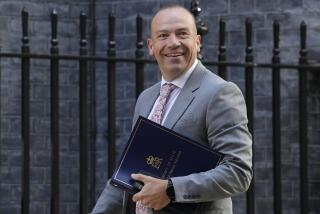Britain Acts to Deprive IRA Suspects of Right to Silence
- Share via
LONDON — The British government introduced legislation Thursday to abolish the right of suspects in Northern Ireland to remain silent under police questioning, leading to the possible end of a centuries-old pillar of British jurisprudence.
The latest measure in Britain’s crackdown on the Irish Republican Army provoked renewed outcries that historic civil liberties are crumbling in Britain. It followed Wednesday’s government ban on broadcast interviews with members of the outlawed IRA and 10 other militant groups and their supporters--Roman Catholic and Protestant--in Northern Ireland.
In the House of Commons, the government of Prime Minister Margaret Thatcher put forward legislation to end the right to silence in Northern Ireland, adding that it also plans to introduce similar restrictions in England and Wales. The latter measure is expected to become law by January.
“Members of terrorist organizations are being trained to refuse to respond to questions put by the police--and this technique is increasingly being adopted by those suspected of serious crimes, including racketeering,” Northern Ireland Secretary Tom King said.
“Justice is being thwarted,” he said.
At present, courts are not allowed to take into consideration that a suspect refused to answer police questions.
King said that under the new law, a judge will be able to draw from silence “whatever inferences appear proper.”
This means a court can regard an accused’s refusal to answer police as an indication of guilt.
King said the change will be aimed particularly at suspects who refuse to respond when arrested and then come up in court with a defense they could have put forward immediately, such as detailed alibis.
The new measure was virtually certain of passage in the 650-member Commons where Thatcher’s Conservatives have a huge 101-seat overall majority.
Opposition Labor Party deputy leader Roy Hattersley said the right to silence is “an essential element of a free society.”
“To abolish the right to silence is to place a terrible risk against those who are verbally inadequate, those who are afraid, who simply are cautious and wish to speak to a solicitor (lawyer) before saying anything,” Hattersley said.
Under a historic 1966 ruling in the case of Miranda vs. Arizona, the U.S. Supreme Court said police must tell suspects before interrogating them that they have a right to remain silent, to confer with a lawyer before answering any questions and to have a lawyer provided if they cannot afford to hire one. The court said such warnings are needed to protect suspects’ privilege against self-incrimination, assured by the U.S. Constitution’s Fifth Amendment.
Like the broadcast ban, the new measure is part of a security package promised by the Thatcher government after a surge of killings and bombings by the IRA since this spring.
Thatcher hinted in Commons on Thursday that the government might soon require election candidates to swear an oath renouncing violence. “If we go ahead with that, we will do it by legislation and will do it at the earliest possible opportunity,” she said.
In addition, the government plans to introduce laws this winter to freeze and seize the funds of guerrilla organizations.
Home Secretary Douglas Hurd said Thursday that a report on the right to silence in England and Wales is due in the new year, adding, “Legislation will be brought forward at the earliest possible opportunity.”
The latest announcements provoked fears that the Thatcher government is sacrificing democratic fundamentals in its battle against the mainly Catholic IRA’s violent campaign to end British rule in Protestant-dominated Northern Ireland.
“Northern Ireland is being used as a laboratory for Draconian measures to be used later in other parts of the United Kingdom,” said Laborite Kevin McNamara.
The Republic of Ireland, where the IRA is also banned, already forbids broadcast interviews with members of the IRA or its legal political front, Sinn Fein, and restricts suspects’ right to silence.
Sinn Fein said the latest British move brings Thatcher’s government closer to the administrations of Chile and South Africa.
“The right to silence is . . . enshrined in the legal systems of most of the world’s civilized countries,” Sinn Fein said in a statement.
In Britain, the right dates from the 17th Century and was designed to protect ill-educated suspects from unfairly incriminating themselves.
More to Read
Sign up for Essential California
The most important California stories and recommendations in your inbox every morning.
You may occasionally receive promotional content from the Los Angeles Times.













